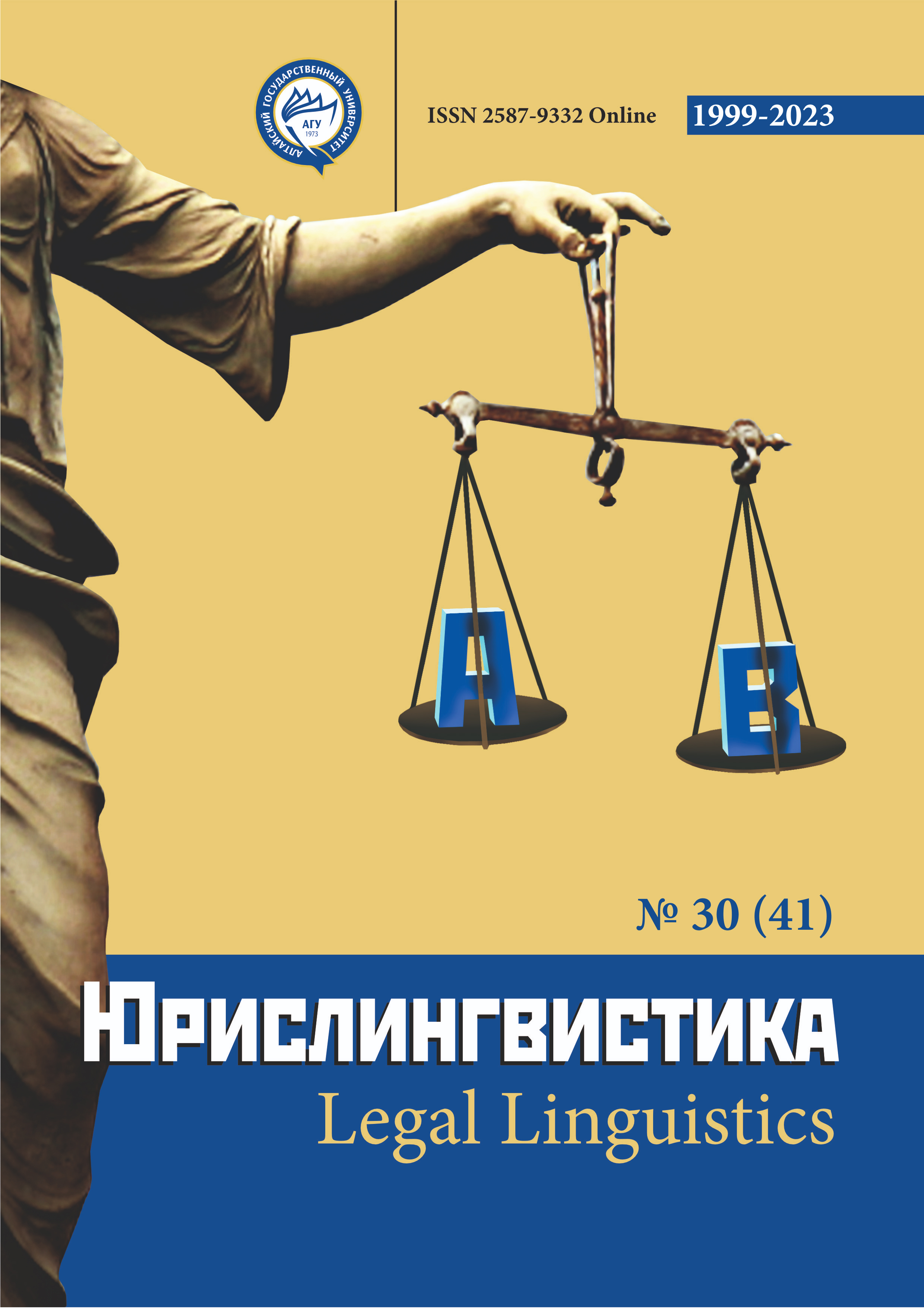Criminalistic Characteristics of Crimes: Terminological Aspect
УДК 343.98, ББК 67.523
Abstract
The article concentrates on the criminalistic characteristics of crimes as one of the key concepts of the criminalistic methodology of crime investigation from the point of view of the terminology used to designate it and its correspondence to the content of the concept. The article considers the evolution of views and approaches that have developed in science regarding the role of criminalistic characteristics of crimes in the structure of newly devised private methods, its content and structure. At the same time the article notes both substantial aspects of the criminalistic characteristics of crimes admitted by most scientists, and aspects that cause dispute. The analysis of the structure of the criminalistic characteristics of crimes and the main approaches developed on this issue in legal literature is carried out. The main elements proposed for inclusion into the structure of the forensic characteristics are considered and evaluated. Attention is focused on the need for further research on the issues of criminalistic characteristics of crimes and the possible development areas are proposed. One of such development areas is devising uniform criteria for building the structure of the criminalistic characteristics of crimes. In this connection, the article provides an overview of the author positions existing in this regard in forensic literature, where elements of the corpus delicti, circumstances to be proved in a criminal case, etc. are seen as a criterion. The reasons for the significant divergence of the positions of scientists towards the content and structure of the criminalistic characteristics of crimes are analyzed. One of the main reasons is different understanding by the authors of the essence and role of the criminalistic characteristics of crimes in the structure of the investigation methodology conditioned among other things by the employed terminology – "criminalistic characteristics of crimes", which does not accurately reflect the essence of the designated concept. In this connection, the analysis of the terminology with regard to etymology has been carried out and proposals for its further application in forensic methodology have been formed.
Downloads
Metrics
References
Артамонов И. И. Методологические аспекты криминалистической характеристики / Криминалистическая характеристика преступлений. М., 1984.
Белкин Р. С. Понятие, ставшее «криминалистическим пережитком» / Российское законодательство и юридические науки в современных условиях: состояние, проблемы, перспективы. Тула, 2000.
Беспечный О. В. Некоторые вопросы структуры методик расследования преступлений против правосудия / Проблемы теории и практики исполнения уголовно-процессуальных обязанностей: сборник статей ХХ Международной научно-практической конференции. Барнаул, 2022. С. 221-224.
Букаев Н. М. Криминалистика: методика расследования преступлений. Курс лекций. Владивосток, 2000.
Возгрин И. А. Криминалистическая методика расследования. Минск, 1983.
Гавло В. К. Наследие Р. С. Белкина и дискуссионные вопросы / Роль и значение деятельности проф. Р. С. Белкина в становлении и развитии современной криминалистики. М., 2002. С. 207-212.
Гавло В. К. Теоретические проблемы и практика применения методики расследования отдельных видов преступлений. Томск, 1985.
Злобин С. Г. Криминалистическая характеристика сбыта псевдо-деактивированного огнестрельного оружия с использованием интернет-ресурсов / Вестник экономической безопасности. - 2022. - № 3. - С. 99-103.
Иващенко М. А. Организационные основы расследования преступлений против половой неприкосновенности и половой свободы несовершеннолетних, совершаемых с использованием сети Интернет / Вестник Московской академии Следственного комитета Российской Федерации. - 2022. - № 1. - С. 88-95.
Колдин В. Я. Криминалистическое знание преступной деятельности: функция моделирования / Советское государство и право. - 1987. - № 2. - С. 65.
Криминалистика: краткая энциклопедия. М., 1993.
Митричев С. П. Методика расследования отдельных видов преступлений. М., 1973.
Облаков А. Ф. Криминалистическая характеристика преступлений и криминалистические ситуации. Хабаровск, 1985.
Образцов В. А. Криминалистическая характеристика преступлений: дискуссионные вопросы и пути их решения / Криминалистическая характеристика преступлений. М., 1984.
Пантелеев И. Ф. Теоретические проблемы советской криминалистики. М., 1980.
Селиванов Н. А. Криминалистические характеристики преступлений и следственные ситуации в методике расследования / Социалистическая законность. - 1977. - № 2. - С. 56.
Семенихина Т. Н. Методика расследования дистанционных мошенничеств, совершаемых с использованием информационно-телекоммуникационных технологий под предлогом продажи (покупки) различных товарно-материальных ценностей на интернет-сайтах / Вестник Воронежского университета МВД России. - № 1. - 2022. - С. 1-7.
Советский энциклопедический словарь. М., 1986.
Танасевич В. Г. О криминалистической характеристике преступлений / Вопросы борьбы с преступностью. - М., 1976. - Вып. 25. - С. 102.
Харченко С. В., Иванов П. И. К вопросу о криминалистической характеристике экономических преступлений в агропромышленном комплексе России / Вестник Московской академии Следственного комитета РФ. - № 1. - 2021. - С. 93-98.
Хмыров А. А. Криминалистическая характеристика преступления и предмет доказывания / Криминалистическая характеристика преступлений. М., 1984.
Copyright (c) 2023 Мария Неймарк, Олег Беспечный

This work is licensed under a Creative Commons Attribution 4.0 International License.
The authors, which are published in this journal, agree to the following conditions:
1. Authors retain the copyright to the work and transfer to the journal the right of the first publication along with the work, at the same time licensing it under the terms of the Creative Commons Attribution License, which allows others to distribute this work with the obligatory indication of the authorship of this work and a link to the original publication in this journal .
2. The authors retain the right to enter into separate, additional contractual agreements for the non-exclusive distribution of the version of the work published by this journal (for example, to place it in the university depository or to publish it in a book), with reference to the original publication in this journal.
3. Authors are allowed to post their work on the Internet (for example, in a university repository or on their personal website) before and during the review process of this journal, as this may lead to a productive discussion, as well as more links to this published work (See The Effect of Open Access).











